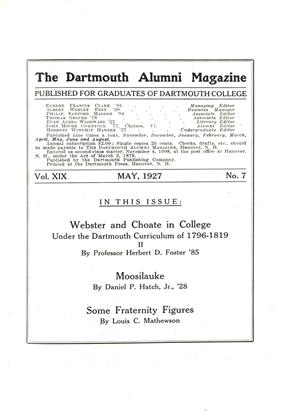(From The Princeton Alumni Weekly)
As a result of repeated attacks on the game of intercollegiate football, and in a positive effort to save the sport from its alleged evils, President Ernest M. Hopkins of Dartmouth College recently made public his advocacy of a plan for the revolutionary reformation of the gridiron sport. His specific suggestions provide : first, limitation of eligibility for participation in intercollegiate football on varsity teams to Sophomores and Juniors; second, scheduling of major games on reciprocal basis, by which each college should develop from the varsity squad two major teams, one of which should play at home and the other on the rivals' grounds, on the same afternoon; third, abolition of paid coaching and substitution of student coaching, the coaching to be done by Seniors who have played two years on the varsity teams.
Two men prominently connected with the administration of Princeton athletics were in- terviewed by the newspapers on the subject of the Hopkins proposal. Dean H. B. Fine 'BO, long a member of the Board of Athletic Con- trol, was quoted as saying: "It doesn't seem practicable to me. You know we don't make very much of over-emphasis here at Princeton."
Dr. C. W. Kennedy 'o3,»Chairman of the Board of Athletic Control who is about to go on sabbatical leave, commented in greater detail. Coming from one who has made an extensive study of intercollegiate athletics in theory and practice, his statement, which follows, is of special interest:
"Anyone familiar with President Hopkins' long record of understanding contact with col lege sport will naturally appreciate with respect any suggestion he makes in that field, and will wish to hear in detail his reasons for particular suggestions.
"However, after careful reading of his proposals, as given in the daily press, I am far from convinced that the suggestions he has made for diminishing emphasis on college football would have that effect. Indeed, it would seem a question whether in certain ways the changes he suggests might not actully increase, rather than diminish, emphasis upon that sport.
"One factor that has represented a steady improvement in college sport in the last two decades has been the gradual elimination of alumni proselyting of football material. While it would be rash to assert that this practice has entirely ceased it is clear that in many colleges a more enlightened alumni opinion has very markedly curbed this evil. It would seem quite possible that the combined effect of two of President Hopkins' proposals might set up a temptation toward a return to organized and competitive proselyting.
"He suggests, first, that only Sophomores and Juniors be permitted to represent the college in football competition, and, second, that two varsity teams be developed to play simultaneously on home grounds and away. The effect of the first of these suggestions would be to cut down available varsity material in football by one-third. The effect of the second would be to double the need for such material. The combined effect of these two changes, therefore, would be in the direction of creating a demand for a much larger supply of varsity football material than exists under the present system, and a temptation, inherent in this new demand, to secure such additional supply by competitive proselyting. This effect would probably be felt with greatest emphasis in the case of colleges of small enrolment.
The changes in football rules in recent years which have given us the modern open game have had the effect of more nearly equalizing competition in football as between the larger universities and the smaller colleges. It would seem probable that one result of these two suggestions, if adopted, would be to restore the situation of two decades ago in which a smaller college had little chance of defeating a big rival otherwise than by a fluke, or by a system of continuous organized proselyting.
"President Hopkins undoubtedly contemplated the other solution of the problem, namely, the development of larger numbers of men already in college to a level of varsity effectiveness. Under proper coaching this would probably in some measure result. But the solution of proselyting has always been the easier road, and the temptation to a return to this method would, in my opinion, be greatly increased by the changes he suggests.
"As to undergraduate coaching I am completely skeptical. In the first place, I see no reason to believe that the spirit of undergraduate coaching would be any more idealistic than that of progressive coaches under our present system, if as much so. In the "second place, it is a very serious question whether the manysided responsibility of such coaching is not much greater than undergraduates should be permitted to assume, and whether it would not in the end tend toward a return to the old system of voluntary and irresponsible alumni assistance which has happily become a thing of the past."
 View Full Issue
View Full Issue
More From This Issue
-
 Article
ArticleWEBSTER AND CHOATE IN COLLEGE
May 1927 By Herbert Darling Foster '85 -
 Article
ArticleTHE UNDERGRADUATE CHAIR
May 1927 -
 Article
ArticleMOOSILAUKE
May 1927 By Daniel P. Hatch, Jr. '28 -
 Article
ArticleSOME FRATERNITY FIGURES
May 1927 By Louis C. Mathewson -
 Article
ArticleDARTMOUTH STUDENTS SAID TO BE IRRELIGIOUS
May 1927 -
 Class Notes
Class NotesClass of 1921
May 1927 By Herrick Brown
Article
-
 Article
ArticleProf. Wilson Given Oxford Award for Book on Diderot
February 1954 -
 Article
ArticleREYNOLDS TROPHY WINNER
JUNE 1964 -
 Article
ArticleA Wah Hoo Wah for —
JULY 1967 -
 Article
ArticleMasthead
FEBRUARY 1968 -
 Article
ArticleVP Paganucci to join W.R. Grace
JANUARY/FEBRUARY 1986 -
 Article
ArticleThe Green: A House Mover and an ex-President Proved Who Owns It (Didn't They?)
May 1976 By Jabberwocky, Lewis Carroll, JAMES L. FARLEY '42


